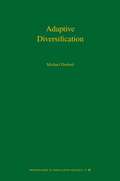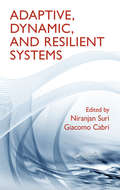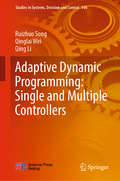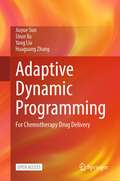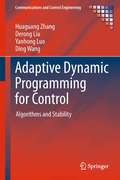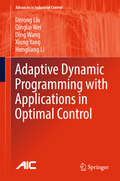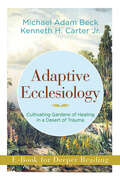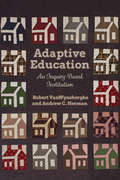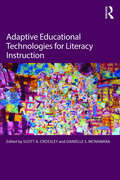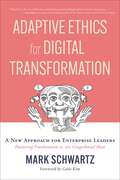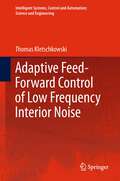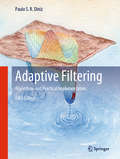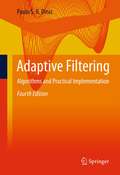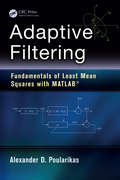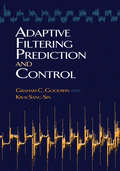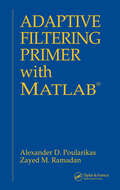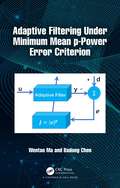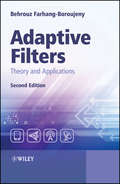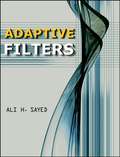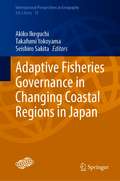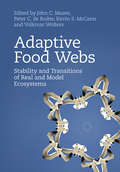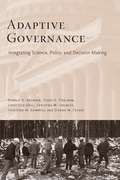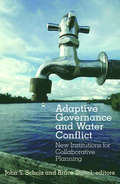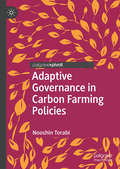- Table View
- List View
Adaptive Diversification (Monographs in Population Biology #48)
by Michael DoebeliUnderstanding the mechanisms driving biological diversity remains a central problem in ecology and evolutionary biology. Traditional explanations assume that differences in selection pressures lead to different adaptations in geographically separated locations. This book takes a different approach and explores adaptive diversification--diversification rooted in ecological interactions and frequency-dependent selection. In any ecosystem, birth and death rates of individuals are affected by interactions with other individuals. What is an advantageous phenotype therefore depends on the phenotype of other individuals, and it may often be best to be ecologically different from the majority phenotype. Such rare-type advantage is a hallmark of frequency-dependent selection and opens the scope for processes of diversification that require ecological contact rather than geographical isolation. Michael Doebeli investigates adaptive diversification using the mathematical framework of adaptive dynamics. Evolutionary branching is a paradigmatic feature of adaptive dynamics that serves as a basic metaphor for adaptive diversification, and Doebeli explores the scope of evolutionary branching in many different ecological scenarios, including models of coevolution, cooperation, and cultural evolution. He also uses alternative modeling approaches. Stochastic, individual-based models are particularly useful for studying adaptive speciation in sexual populations, and partial differential equation models confirm the pervasiveness of adaptive diversification. Showing that frequency-dependent interactions are an important driver of biological diversity, Adaptive Diversification provides a comprehensive theoretical treatment of adaptive diversification.
Adaptive, Dynamic, and Resilient Systems
by Niranjan Suri Giacomo CabriAs the complexity of today's networked computer systems grows, they become increasingly difficult to understand, predict, and control. Addressing these challenges requires new approaches to building these systems. Adaptive, Dynamic, and Resilient Systems supplies readers with various perspectives of the critical infrastructure that systems of netwo
Adaptive Dynamic Programming: Single and Multiple Controllers (Studies in Systems, Decision and Control #166)
by Ruizhuo Song Qinglai Wei Qing LiThis book presents a class of novel optimal control methods and games schemes based on adaptive dynamic programming techniques. For systems with one control input, the ADP-based optimal control is designed for different objectives, while for systems with multi-players, the optimal control inputs are proposed based on games. In order to verify the effectiveness of the proposed methods, the book analyzes the properties of the adaptive dynamic programming methods, including convergence of the iterative value functions and the stability of the system under the iterative control laws. Further, to substantiate the mathematical analysis, it presents various application examples, which provide reference to real-world practices.
Adaptive Dynamic Programming: For Chemotherapy Drug Delivery
by Jiayue Sun Shun Xu Yang Liu Huaguang ZhangThis open access book focuses on the practical application of Adaptive Dynamic Programming (ADP) in chemotherapy drug delivery, taking into account clinical variables and real-time data. ADP's ability to adapt to changing conditions and make optimal decisions in complex and uncertain situations makes it a valuable tool in addressing pressing challenges in healthcare and other fields. As optimization technology evolves, we can expect to see even more sophisticated and powerful solutions emerge.
Adaptive Dynamic Programming for Control: Algorithms and Stability (Communications and Control Engineering)
by Yanhong Luo Huaguang Zhang Ding Wang Derong LiuThere are many methods of stable controller design for nonlinear systems. In seeking to go beyond the minimum requirement of stability, Adaptive Dynamic Programming in Discrete Time approaches the challenging topic of optimal control for nonlinear systems using the tools of adaptive dynamic programming (ADP). The range of systems treated is extensive; affine, switched, singularly perturbed and time-delay nonlinear systems are discussed as are the uses of neural networks and techniques of value and policy iteration. The text features three main aspects of ADP in which the methods proposed for stabilization and for tracking and games benefit from the incorporation of optimal control methods: * infinite-horizon control for which the difficulty of solving partial differential Hamilton-Jacobi-Bellman equations directly is overcome, and proof provided that the iterative value function updating sequence converges to the infimum of all the value functions obtained by admissible control law sequences; * finite-horizon control, implemented in discrete-time nonlinear systems showing the reader how to obtain suboptimal control solutions within a fixed number of control steps and with results more easily applied in real systems than those usually gained from infinite-horizon control; * nonlinear games for which a pair of mixed optimal policies are derived for solving games both when the saddle point does not exist, and, when it does, avoiding the existence conditions of the saddle point. Non-zero-sum games are studied in the context of a single network scheme in which policies are obtained guaranteeing system stability and minimizing the individual performance function yielding a Nash equilibrium. In order to make the coverage suitable for the student as well as for the expert reader, Adaptive Dynamic Programming in Discrete Time: * establishes the fundamental theory involved clearly with each chapter devoted to a clearly identifiable control paradigm; * demonstrates convergence proofs of the ADP algorithms to deepen understanding of the derivation of stability and convergence with the iterative computational methods used; and * shows how ADP methods can be put to use both in simulation and in real applications. This text will be of considerable interest to researchers interested in optimal control and its applications in operations research, applied mathematics computational intelligence and engineering. Graduate students working in control and operations research will also find the ideas presented here to be a source of powerful methods for furthering their study.
Adaptive Dynamic Programming with Applications in Optimal Control (Advances in Industrial Control)
by Ding Wang Derong Liu Qinglai Wei Xiong Yang Hongliang LiThis book covers the most recent developments in adaptive dynamic programming (ADP). The text begins with a thorough background review of ADP making sure that readers are sufficiently familiar with the fundamentals. In the core of the book, the authors address first discrete- and then continuous-time systems. Coverage of discrete-time systems starts with a more general form of value iteration to demonstrate its convergence, optimality, and stability with complete and thorough theoretical analysis. A more realistic form of value iteration is studied where value function approximations are assumed to have finite errors. Adaptive Dynamic Programming also details another avenue of the ADP approach: policy iteration. Both basic and generalized forms of policy-iteration-based ADP are studied with complete and thorough theoretical analysis in terms of convergence, optimality, stability, and error bounds. Among continuous-time systems, the control of affine and nonaffine nonlinear systems is studied using the ADP approach which is then extended to other branches of control theory including decentralized control, robust and guaranteed cost control, and game theory. In the last part of the book the real-world significance of ADP theory is presented, focusing on three application examples developed from the authors' work: * renewable energy scheduling for smart power grids; * coal gasification processes; and * water-gas shift reactions. Researchers studying intelligent control methods and practitioners looking to apply them in the chemical-process and power-supply industries will find much to interest them in this thorough treatment of an advanced approach to control.
Adaptive Ecclesiology: Cultivating Gardens of Healing in a Desert of Trauma
by Michael Adam Beck Kenneth H. Carter Jr.This digital-only e-book provides foundational material on adaptive leadership for the church. It is for seminary students, people training for ministry in other settings, and local church leaders who are striving to understand the biblical and theological underpinnings of adaptive ecclesiology. These readers will also gain knowledge about how this approach has worked historically, and how it is used inside and outside the Church today. The authors’ main book on the topic, Gardens in the Desert: How the Adaptive Church Can Lead a Whole New Life, is more practical in its focus, helping pastors and other leaders know how to begin shifting toward adaptive ecclesiology in their own local churches. The Adaptive Ecclesiology digital-only e-book is a deeper look at the foundations of the topic.
Adaptive education: An Inquiry-Based Institution
by Robert Vanwynsberghe Andrew C. HermanThe obstacles that prevent the latest educational research reaching the classroom are daunting: few channels to communicate the results of educational research, fewer opportunities for teachers to participate in research themselves, and little support for honing a scientific approach to teaching. The solution, according to Robert VanWynsberghe and Andrew C. Herman, is radical but simple: transform the educational institution itself into a laboratory for continuous experimentation. Inspired by the pragmatist theories of John Dewey and Roberto Unger, Adaptive Education explains how schools and universities can incorporate research processes into their activities, institutionalize a policy of inquiry and experimentation, and make teaching an evidence-based profession. An audacious proposal to reform the education system from the ground up, Adaptive Education is a roadmap for creating an institution that empowers teachers, parents, and the community to innovate, adapt, and explore.
Adaptive Educational Technologies for Literacy Instruction
by Scott A. Crossley Danielle S. McNamaraWhile current educational technologies have the potential to fundamentally enhance literacy education, many of these tools remain unknown to or unused by today’s practitioners due to a lack of access and support. Adaptive Educational Technologies for Literacy Instruction presents actionable information to educators, administrators, and researchers about available educational technologies that provide adaptive, personalized literacy instruction to students of all ages. These accessible, comprehensive chapters, written by leading researchers who have developed systems and strategies for classrooms, introduce effective technologies for reading comprehension and writing skills.
Adaptive Engineering, LLC
by Richard S. Ruback Royce YudkoffThe owner and CEO of Adaptive Engineering was facing an important decision: should he focus on rebuilding its core professional services business which had generated significant revenue and cash flow over the past several years, or should he focus on developing and marketing licensed software which had been under development for several years but had yet to become profitable.
Adaptive Ethics for Digital Transformation: A New Approach for Enterprise Leaders (Featuring Frankenstein vs. the Gingerbread Man)
by Mark SchwartzDigital transformation doesn't just raise ethical issues, it—in itself—is an ethical shift.Business leaders today are struggling to manage conflicting imperatives, those of the emerging digital world and those of the bureaucratic world of the past. The act of digital transformation requires a deep change in the moral outlook and ethical assumptions of a business. But how do we get there?Enterprise strategist and author Mark Schwartz shows how we need to learn to think differently about relationships with customers and employees. That the ethics of digital transformation is a matter of cultivating and applying virtues rather than applying rules. Ethics is not just a matter of refraining from doing bad things. It's a matter of building the world we want, and it's the job of company executives.Featuring a chapter on bullshit, a handy chart of excuses for bad behavior, and Schwartz's typically paradoxical blend of deep insight and pasta jokes, this book guides business leaders as they struggle to adapt their bureaucratic framework of ethics to the emerging landscape of the digital world. By the end of the book, business leaders will rethink what it takes to be an ethical organization.
Adaptive Feed-Forward Control of Low Frequency Interior Noise (Intelligent Systems, Control and Automation: Science and Engineering #56)
by Thomas KletschkowskiThis book presents a mechatronic approach to Active Noise Control (ANC). It describes the required elements of system theory, engineering acoustics, electroacoustics and adaptive signal processing in a comprehensive, consistent and systematic manner using a unified notation. Furthermore, it includes a design methodology for ANC-systems, explains its application and describes tools to be used for ANC-system design. From the research point of view, the book presents new approaches to sound source localization in weakly damped interiors. One is based on the inverse finite element method, the other is based on a sound intensity probe with an active free field. Furthermore, a prototype of an ANC-system able to reach the physical limits of local (feed-forward) ANC is described. This is one example for applied research in ANC-system design. Other examples are given for (i) local ANC in a semi-enclosed subspace of an aircraft cargo hold and (ii) for the combination of audio entertainment with ANC.
Adaptive Filtering: Algorithms and Practical Implementation (The\springer International Series In Engineering And Computer Science Ser. #694)
by Paulo S. DinizIn the fifth edition of this textbook, author Paulo S.R. Diniz presents updated text on the basic concepts of adaptive signal processing and adaptive filtering. He first introduces the main classes of adaptive filtering algorithms in a unified framework, using clear notations that facilitate actual implementation. Algorithms are described in tables, which are detailed enough to allow the reader to verify the covered concepts. Examples address up-to-date problems drawn from actual applications. Several chapters are expanded and a new chapter ‘Kalman Filtering’ is included. The book provides a concise background on adaptive filtering, including the family of LMS, affine projection, RLS, set-membership algorithms and Kalman filters, as well as nonlinear, sub-band, blind, IIR adaptive filtering, and more. Problems are included at the end of chapters. A MATLAB package is provided so the reader can solve new problems and test algorithms. The book also offers easy access to working algorithms for practicing engineers.
Adaptive Filtering: Algorithms and Practical Implementation (The\springer International Series In Engineering And Computer Science Ser. #694)
by Paulo S. R. DinizIn the fourth edition of Adaptive Filtering: Algorithms and Practical Implementation, author Paulo S. R. Diniz presents the basic concepts of adaptive signal processing and adaptive filtering in a concise and straightforward manner. The main classes of adaptive filtering algorithms are presented in a unified framework, using clear notations that facilitate actual implementation. The main algorithms are described in tables, which are detailed enough to allow the reader to verify the covered concepts. Many examples address problems drawn from actual applications. New material to this edition includes: Analytical and simulation examples in Chapters 4, 5, 6 and 10 Appendix E, which summarizes the analysis of set-membership algorithm Updated problems and references Providing a concise background on adaptive filtering, this book covers the family of LMS, affine projection, RLS and data-selective set-membership algorithms as well as nonlinear, sub-band, blind, IIR adaptive filtering, and more. Several problems are included at the end of chapters, and some of these problems address applications. A user-friendly MATLAB package is provided where the reader can easily solve new problems and test algorithms in a quick manner. Additionally, the book provides easy access to working algorithms for practicing engineers.
Adaptive Filtering: Fundamentals of Least Mean Squares with MATLAB® (Electrical Engineering Primer Ser.)
by Alexander D. PoularikasAdaptive filters are used in many diverse applications, appearing in everything from military instruments to cellphones and home appliances. Adaptive Filtering: Fundamentals of Least Mean Squares with MATLAB® covers the core concepts of this important field, focusing on a vital part of the statistical signal processing area—the least mean square (LMS) adaptive filter. This largely self-contained text: Discusses random variables, stochastic processes, vectors, matrices, determinants, discrete random signals, and probability distributions Explains how to find the eigenvalues and eigenvectors of a matrix and the properties of the error surfaces Explores the Wiener filter and its practical uses, details the steepest descent method, and develops the Newton’s algorithm Addresses the basics of the LMS adaptive filter algorithm, considers LMS adaptive filter variants, and provides numerous examples Delivers a concise introduction to MATLAB®, supplying problems, computer experiments, and more than 110 functions and script files Featuring robust appendices complete with mathematical tables and formulas, Adaptive Filtering: Fundamentals of Least Mean Squares with MATLAB® clearly describes the key principles of adaptive filtering and effectively demonstrates how to apply them to solve real-world problems.
Adaptive Filtering Prediction and Control
by Kwai Sang Sin Graham C GoodwinThis unified survey of the theory of adaptive filtering, prediction, and control focuses on linear discrete-time systems and explores the natural extensions to nonlinear systems. In keeping with the importance of computers to practical applications, the authors emphasize discrete-time systems. Their approach summarizes the theoretical and practical aspects of a large class of adaptive algorithms.Ideal for advanced undergraduate and graduate classes, this treatment consists of two parts. The first section concerns deterministic systems, covering models, parameter estimation, and adaptive prediction and control. The second part examines stochastic systems, exploring optimal filtering and prediction, parameter estimation, adaptive filtering and prediction, and adaptive control. Extensive appendices offer a summary of relevant background material, making this volume largely self-contained. Readers will find that these theories, formulas, and applications are related to a variety of fields, including biotechnology, aerospace engineering, computer sciences, and electrical engineering.
Adaptive Filtering Primer with MATLAB
by Alexander D. Poularikas Zayed M. Ramadan<p>Because of the wide use of adaptive filtering in digital signal processing and, because most of the modern electronic devices include some type of an adaptive filter, a text that brings forth the fundamentals of this field was necessary. The material and the principles presented in this book are easily accessible to engineers, scientists, and students who would like to learn the fundamentals of this field and have a background at the bachelor level. <p>Adaptive Filtering Primer with MATLAB clearly explains the fundamentals of adaptive filtering supported by numerous examples and computer simulations. The authors introduce discrete-time signal processing, random variables and stochastic processes, the Wiener filter, properties of the error surface, the steepest descent method, and the least mean square (LMS) algorithm. They also supply many MATLAB functions and m-files along with computer experiments to illustrate how to apply the concepts to real-world problems. The book includes problems along with hints, suggestions, and solutions for solving them. An appendix on matrix computations completes the self-contained coverage. <p>With applications across a wide range of areas, including radar, communications, control, medical instrumentation, and seismology, Adaptive Filtering Primer with MATLAB is an ideal companion for quick reference and a perfect, concise introduction to the field.</p>
Adaptive Filtering Under Minimum Mean p-Power Error Criterion
by Badong Chen Wentao MaAdaptive filtering still receives attention in engineering as the use of the adaptive filter provides improved performance over the use of a fixed filter under the time-varying and unknown statistics environments. This application evolved communications, signal processing, seismology, mechanical design, and control engineering. The most popular optimization criterion in adaptive filtering is the well-known minimum mean square error (MMSE) criterion, which is, however, only optimal when the signals involved are Gaussian-distributed. Therefore, many "optimal solutions" under MMSE are not optimal. As an extension of the traditional MMSE, the minimum mean p-power error (MMPE) criterion has shown superior performance in many applications of adaptive filtering. This book aims to provide a comprehensive introduction of the MMPE and related adaptive filtering algorithms, which will become an important reference for researchers and practitioners in this application area. The book is geared to senior undergraduates with a basic understanding of linear algebra and statistics, graduate students, or practitioners with experience in adaptive signal processing.Key Features: Provides a systematic description of the MMPE criterion. Many adaptive filtering algorithms under MMPE, including linear and nonlinear filters, will be introduced. Extensive illustrative examples are included to demonstrate the results.
Adaptive Filters
by Behrouz Farhang-BoroujenyThis second edition of Adaptive Filters: Theory and Applications has been updated throughout to reflect the latest developments in this field; notably an increased coverage given to the practical applications of the theory to illustrate the much broader range of adaptive filters applications developed in recent years. The book offers an easy to understand approach to the theory and application of adaptive filters by clearly illustrating how the theory explained in the early chapters of the book is modified for the various applications discussed in detail in later chapters. This integrated approach makes the book a valuable resource for graduate students; and the inclusion of more advanced applications including antenna arrays and wireless communications makes it a suitable technical reference for engineers, practitioners and researchers. Key features:* Offers a thorough treatment of the theory of adaptive signal processing; incorporating new material on transform domain, frequency domain, subband adaptive filters, acoustic echo cancellation and active noise control.* Provides an in-depth study of applications which now includes extensive coverage of OFDM, MIMO and smart antennas.* Contains exercises and computer simulation problems at the end of each chapter.* Includes a new companion website hosting MATLAB® simulation programs which complement the theoretical analyses, enabling the reader to gain an in-depth understanding of the behaviours and properties of the various adaptive algorithms.
Adaptive Filters (Wiley - Ieee Ser.)
by Ali H. SayedAdaptive filtering is a topic of immense practical and theoretical value, having applications in areas ranging from digital and wireless communications to biomedical systems. This book enables readers to gain a gradual and solid introduction to the subject, its applications to a variety of topical problems, existing limitations, and extensions of current theories. The book consists of eleven parts?each part containing a series of focused lectures and ending with bibliographic comments, problems, and computer projects with MATLAB solutions.
Adaptive Fisheries Governance in Changing Coastal Regions in Japan (International Perspectives in Geography #13)
by Akiko Ikeguchi Takafumi Yokoyama Seishiro SakitaJapan’s fisheries sector is undergoing a major restructuring. The coastal ecological change and natural disasters such as tsunami demand that communities transform or organize resource governance anew. Under the national policy of decentralization to cope with the aging and declining population, the availability of local infrastructure, both physical and social, plays a significant role in the adaptive capacity of the community. This book presents the historical and spatial dynamics of coastal fisheries resource governance in response to different environmental changes, its socio-political context, and challenges raised by academicians. The reader will find the national trends and geographical patterns of the administrative restructuring in the communities and fisheries cooperatives from abundant maps and figures, as well as a rich description of adaptive governance in the scale of region and community by ecological-historical approaches. Comparative analysis of the communities provides a practical framework to understand a variety of local resources in Japan’s coastal regions, which will serve as a guide to the development of alternative adaptive governance in community-based small-scale fisheries in the world.
Adaptive Food Webs: Stability and Transitions of Real and Model Ecosystems
by Moore Mccann Peter C. Kevin S. John C. De Ruiter Volkmar WoltersPresenting new approaches to studying food webs, this book uses practical management and policy examples to demonstrate the theory behind ecosystem management decisions and the broader issue of sustainability. All the information that readers need to use food web analyses as a tool for understanding and quantifying transition processes is provided. Advancing the idea of food webs as complex adaptive systems, readers are challenged to rethink how changes in environmental conditions affect these systems. Beginning with the current state of thinking about community organisation, complexity and stability, the book moves on to focus on the traits of organisms, the adaptive nature of communities and their impacts on ecosystem function. The final section of the book addresses the applications to management and sustainability. By helping to understand the complexities of multispecies networks, this book provides insights into the evolution of organisms and the fate of ecosystems in a changing world.
Adaptive Governance: Integrating Science, Policy, and Decision Making
by Ronald Brunner Toddi Steelman Lindy Coe-Juell Christina Cromley Christine Edwards Donna TuckerDrawing on five detailed case studies from the American West, the authors explore and clarify how to expedite a transition toward adaptive governance and break the gridlock in natural resource policymaking. Unlike scientific management, which relies on science as the foundation for policies made through a central bureaucratic authority, adaptive governance integrates various types of knowledge and organizations. Adaptive governance relies on open decision-making processes recognizing multiple interests, community-based initiatives, and an integrative science in addition to traditional science. Case studies discussed include a program to protect endangered fish in the Colorado River with the active participation of water developers and environmentalists; a district ranger's innovative plan to manage national forestland in northern New Mexico; and how community-based forestry groups are affecting legislative change in Washington, D.C.
Adaptive Governance and Water Conflict: New Institutions for Collaborative Planning
by John T. Scholz Bruce StiftelWater policy seems in perpetual crisis. Increasingly, conflicts extend beyond the statutory authority, competence, geographical jurisdictions, and political constituencies of highly specialized governing authorities. While other books address specific policy approaches or the application of adaptive management strategies to specific problems, this is the first book to focus more broadly on adaptive governance, or the evolution of new institutions that attempt to resolve conflicts among competing authorities. Adaptive Governance and Water Conflict investigates new types of water conflicts among users in the seemingly water-rich Eastern United States. Eight case studies of water quality, water quantity, and habitat preservation or restoration in Florida were chosen to span the range of conflicts crossing fragmented regulatory boundaries. Each begins with a history of the conflict and then focuses on the innovative institutional arrangements - some successful, some not - that evolved to grapple with the resulting challenges. In the chapters that follow, scholars and practitioners in urban planning, political science, engineering, law, policy, administration, and geology offer different theoretical and experience-based perspectives on the cases. Together, they discuss five challenges that new institutions must overcome to develop sustainable solutions for water users: Who is to be involved in the policy process? How are they to interact? How is science to be used? How are users and the public to be made aware? How can solutions be made efficient and equitable? In its diverse perspectives and unique combination of theory, application, and analysis, Adaptive Governance and Water Conflict will be a valuable book for water professionals, policy scientists, students, and scholars in natural resource planning and management.
Adaptive Governance in Carbon Farming Policies
by Nooshin TorabiThis book discusses a variety of different perspectives involved in biodiversity management and bio-sequestration projects in Australia, working towards achieving adaptive governance in carbon farming. It not only examines landholders’ motivation but also the challenges of integrating biodiverse forests into the agricultural landscape. Drawing on the contrast between science and policy stakeholders’ views on carbon farming and the practical challenges of achieving adaptive governance, the book discusses the significant gap between theory and practice encountered in this field of study. The book suggests ways of improving the decision-making capacity of government officials and policymakers involved in managing carbon and biodiversity markets, as well as introducing measures to promote adaptive governance by engaging landholders in more effective land conservation. Climate change is a pressing issue on the global political agenda, and this book makes an important contribution to the ongoing debate. This book will be an invaluable reference for practitioners, policymakers and researchers interested in alternative forms of governance in natural resource management.
